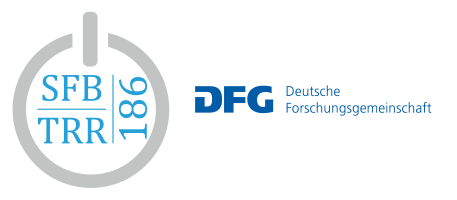
Prof. Dr. Nils Blüthgen

Charite - Universitätsmedizin Berlin
Charitéplatz 1
10117 Berlin
E-mail: Nils.Bluethgen@charite.de
Phone: +49 (30) 2093-9106
Professor of Computational Modelling in Medicine (W2)
2012 - EMBO Short-Term Fellowship, Institute Curie, Paris, France
2008 - MTZ-Award for Medical Systems Biology
2008-2009 - Honorary Lecturer, School of Translational Medicine, University of Manchester, UK
University training and degree
1998-2002 - Studies of Physics (Diplom, mit Auszeichnung) at Technische Universität Berlin
1996-1998 - Studies of Physics (Vordiplom) at Universität Heidelberg
Advanced academic qualifications
2006 - Promotion, Dr. rer. nat, Humboldt Universität zu Berlin (summa cum laude)
Postgraduate professional career
Since 2014 - Professor (tenure) for Computational Modelling in Medicine, Charité Universitätsmedizin Berlin und IRI Life Sciencens, Humboldt Universität Berlin
2009-2013 - Independent Junior Group Leader and Junior Professor (from 2011) in Medical Systems Biology, Charité Universitätsmedizin Berlin
2007-2008 - Research Fellow (tenure track) at Manchester Interdisciplinary Biocentre University Manchester, UK
2005-2007 - Postdoc at the Institute of Molecular Neuroscience, FU Berlin, Germany
Coordinating functions and editorial work
Since 2019 - Deputy Speaker, Steering committee for Genomics, Berlin Institute of Health
Since 2019 - Speaker DFG RTG 2424/1, CompCancer
Since 2015 - Deputy Speaker, Interdisciplinary Research Institute for the Life Sciences
Since 2015 - Speaker, Steering board for bioinformatics, Berlin Institute of Health
Most important publications
-
Brandt, R.*, Sell, T.*, Luethen, M., Uhlitz, F., Klinger, B., Riemer, P., Giesecke, C., Schulze, S., El- Shimy, I. A., Kunkel, D., Fauler, B., Mielke, T., Mages, N., Herrmann, B. G., Sers, C., Blüthgen, N.* and Morkel, M.* (2019) Cell type-dependent differential activation of ERK by oncogenic KRAS in colon cancer and intestinal epithelium. Nature Communications, 10 (1): 2919
-
Dorel, M., Klinger, B., Sieber, A., Prahallad, A., Gross, T., Bosdriesz, E., Wessels, L. and Blüthgen, N. (2018) Modelling Signalling Networks from Perturbation Data. Bioinformatics, 34: 4079-4086
-
Uhlitz, F., Sieber, A., Wyler, E., Fritsche-Guenther, R., Meisig, J., Landthaler, M., Klinger, B. and Blüthgen, N. (2017) An immediate-late gene expression module decodes ERK signal duration. Molecular Systems Biology 13: 928
-
Eduati, F., Doldàn-Martelli, V., Klinger, B., Cokelaer, T., Sieber, A., Kogera, F., Dorel, M., Garnett, M. J., Blüthgen, N. * and Saez-Rodriguez, J. * (2017) Drug resistance mechanisms in colorectal cancer dissected with cell type-specific dynamic logic models. Cancer Research, 77: 3364–75
-
Schmiedel, J. M., Klemm, S., Zheng, Y., Sahay, A., Blüthgen, N.*, Marks, D.S.* and Oudenaarden, A.v.* (2015) MicroRNA control of protein expression noise. Science, 348: 128-132
-
Bentele, K., Saffert, P., Rauscher, R., Ignatova, Z. and Blüthgen, N. (2013) Efficient translation initiation dictates codon usage at gene start. Molecular Systems Biology, 9: 675
-
Klinger, B., Sieber, A., Fritsche-Guenther, R., Witzel, F., Berry, L., Schumacher, D., Yan, Y., Durek, P., Merchant, M., Schäfer, R., Sers, C. and Blüthgen, N. (2013) Network quantification of EGFR signaling unveils potential for targeted combination therapy. Molecular Systems Biology, 9: 673
-
Stelniec, I., Legewie, S., Tchernitsa, O., Witzel, F., Klinger, B., Sers, C., Herzel, H., Blüthgen, N.* and Schäfer, R.* (2012) Reverse-engineering a hierarchical regulatory network downstream of oncogenic KRAS. Molecular Systems Biology, 8: 601
-
Nora, E. P., Lajoie, B. R., Schulz, E. G., Giorgetti, L., Okamoto, I., Servant, N., Piolot, T., Berkum, N. L. v., Meisig, J., Sedat, J., Gribnau, J., Barillot, E., Blüthgen, N., Dekker, J. and Heard, E.. (2012) Spatial partitioning of the regulatory landscape of the X-inactivation centre. Nature, 485: 381-385
-
Fritsche-Guenther, R., Witzel, F., Sieber, A., Herr, R., Schmidt, N., Braun, S., Brummer, T., Sers, C. and Blüthgen, N. (2011) Strong negative feedback from Erk to Raf confers robustness to MAPK signalling. Molecular Systems Biology, 7: 489
* joint corresponding/equal contribution
